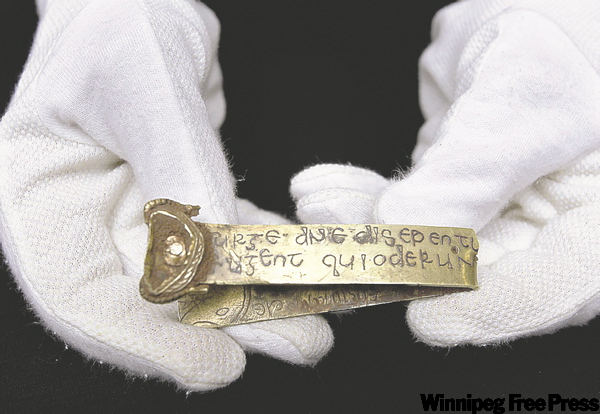Anglo-Saxon treasure find exciting for archeologists
Advertisement
Read this article for free:
or
Already have an account? Log in here »
To continue reading, please subscribe:
Monthly Digital Subscription
$0 for the first 4 weeks*
- Enjoy unlimited reading on winnipegfreepress.com
- Read the E-Edition, our digital replica newspaper
- Access News Break, our award-winning app
- Play interactive puzzles
*No charge for 4 weeks then price increases to the regular rate of $19.95 plus GST every four weeks. Offer available to new and qualified returning subscribers only. Cancel any time.
Monthly Digital Subscription
$4.99/week*
- Enjoy unlimited reading on winnipegfreepress.com
- Read the E-Edition, our digital replica newspaper
- Access News Break, our award-winning app
- Play interactive puzzles
*Billed as $19.95 plus GST every four weeks. Cancel any time.
To continue reading, please subscribe:
Add Free Press access to your Brandon Sun subscription for only an additional
$1 for the first 4 weeks*
*Your next subscription payment will increase by $1.00 and you will be charged $16.99 plus GST for four weeks. After four weeks, your payment will increase to $23.99 plus GST every four weeks.
Read unlimited articles for free today:
or
Already have an account? Log in here »
Hey there, time traveller!
This article was published 25/09/2009 (5948 days ago), so information in it may no longer be current.
LONDON — An amateur treasure hunter prowling English farmland with a metal detector stumbled upon the largest Anglo-Saxon treasure ever found, a massive seventh-century hoard of gold and silver sword decorations, crosses and other items, British archeologists said Thursday.
One expert said the treasure found by 55-year-old Terry Herbert would revolutionize understanding of the Anglo-Saxons, a Germanic people who ruled England from the fifth century until the Norman conquest in 1066. Another said the find would rank among Britain’s best-known historic treasures.
"This is just a fantastic find completely out of the blue," Roger Bland, who managed the cache’s excavation, told The Associated Press. "It will make us rethink the Dark Ages."

The Anglo-Saxons, a group of Germanic tribes, gradually invaded England by sea starting in the fifth century in the wake of the collapse of the Roman Empire. Originally, they came from what is now the coastal region of northwest Germany.
Their artisans made striking objects out of gold and enamel and created poetry including "Beowulf," an anonymous epic poem about a warrior who does battle with monsters and a dragon.
Archeologist Kevin Leahy, who catalogued the find, said the stash appeared to be war loot and included dozens of pommel caps — decorative elements attached to the knobs of sword handles. He noted that "Beowulf" contains a reference to warriors stripping the pommels of their enemies’ weapons as mementoes.
But much other Anglo-Saxon literature and artwork has been lost through warfare, looting, upheavals and the passage of time, leaving scanty evidence for scholars of the period.
Bland said the hoard was unearthed in what was once Mercia, one of five main Anglo-Saxon kingdoms, and is thought to date to 675-725 AD.
The hoard consists of at least 650 items of gold and 530 silver objects weighing more than 2.2 pounds (1 kilo), along with some copper alloy, garnets and glass. A total of 1,345 items have been examined by experts and 56 lumps of earth were found to contain metal artifacts detected by an X-ray machine, meaning the total will likely rise to about 1,500.
Most of the objects are ornaments for weapons and other military artifacts, some inlaid with precious stones.
"I think wealth of this kind must have belonged to a king but we cannot say that for absolute certain," Bland said.
Leslie Webster, the former curator of Anglo-Saxon archeology at the British Museum, said the amount of gold uncovered — about 11 pounds (5 kilograms) — suggested that early medieval England was a far wealthier place than previously believed.
She also said the crosses and other religious artifacts mixed in with the mainly military items, might shed new light on the relationship between Christianity and warfare among the Anglo-Saxons.
— The Associated Press

